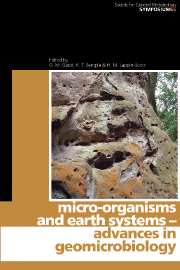Book contents
- Frontmatter
- Contents
- Contributors
- Editors' Preface
- Isotopic-labelling methods for deciphering the function of uncultured micro-organisms
- Biofilms and metal geochemistry: the relevance of micro-organism-induced geochemical transformations
- Minerals, mats, pearls and veils: themes and variations in giant sulfur bacteria
- Soil micro-organisms in Antarctic dry valleys: resource supply and utilization
- New insights into bacterial cell-wall structure and physico-chemistry: implications for interactions with metal ions and minerals
- Horizontal gene transfer of metal homeostasis genes and its role in microbial communities of the deep terrestrial subsurface
- Biosilicification: the role of cyanobacteria in silica sinter deposition
- Metabolic diversity in the microbial world: relevance to exobiology
- Biogeochemical cycling in polar, temperate and tropical coastal zones: similarities and differences
- Fungal roles and function in rock, mineral and soil transformations
- The deep intraterrestrial biosphere
- Iron, nitrogen, phosphorus and zinc cycling and consequences for primary productivity in the oceans
- Mechanisms and environmental impact of microbial metal reduction
- New insights into the physiology and regulation of the anaerobic oxidation of methane
- Biogeochemical roles of fungi in marine and estuarine habitats
- Role of micro-organisms in karstification
- Index
Editors' Preface
Published online by Cambridge University Press: 06 July 2010
- Frontmatter
- Contents
- Contributors
- Editors' Preface
- Isotopic-labelling methods for deciphering the function of uncultured micro-organisms
- Biofilms and metal geochemistry: the relevance of micro-organism-induced geochemical transformations
- Minerals, mats, pearls and veils: themes and variations in giant sulfur bacteria
- Soil micro-organisms in Antarctic dry valleys: resource supply and utilization
- New insights into bacterial cell-wall structure and physico-chemistry: implications for interactions with metal ions and minerals
- Horizontal gene transfer of metal homeostasis genes and its role in microbial communities of the deep terrestrial subsurface
- Biosilicification: the role of cyanobacteria in silica sinter deposition
- Metabolic diversity in the microbial world: relevance to exobiology
- Biogeochemical cycling in polar, temperate and tropical coastal zones: similarities and differences
- Fungal roles and function in rock, mineral and soil transformations
- The deep intraterrestrial biosphere
- Iron, nitrogen, phosphorus and zinc cycling and consequences for primary productivity in the oceans
- Mechanisms and environmental impact of microbial metal reduction
- New insights into the physiology and regulation of the anaerobic oxidation of methane
- Biogeochemical roles of fungi in marine and estuarine habitats
- Role of micro-organisms in karstification
- Index
Summary
The science of the environment encompasses a huge number of biological, chemical and physical disciplines. For several years, scientists have been interested in large-scale environmental processes/phenomena, such as soil formation, global warming and global elemental cycling. Until recently, the role and impact of micro-organisms on these ‘global’ environmental processes has been largely ignored or, at best, underestimated. However, there is growing awareness that important environmental transformations are catalysed, mediated and influenced by micro-organisms, and such knowledge is having an increasing influence on disciplines other than microbiology, such as geology and mineralogy. Geomicrobiology can be defined as the study of the role that microbes have played and are playing in processes of fundamental importance to geology. As such, it is a truly interdisciplinary subject area, necessitating input from physical, chemical and biological sciences, in particular combining the fields of environmental and molecular microbiology together with significant areas of mineralogy, geochemistry and hydrology. As a result, geomicrobiology is probably the most rapidly growing area of microbiology at present. It is timely that this topic should be the subject of a Plenary Symposium volume of the Society for General Microbiology (SGM) to emphasize and define this important area of microbiological interest, and help to promote exciting collaborations between microbiologists and other environmental and Earth scientists.
- Type
- Chapter
- Information
- Micro-organisms and Earth Systems , pp. xi - xiiPublisher: Cambridge University PressPrint publication year: 2005



